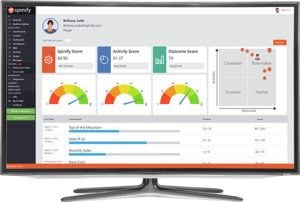Hey, Coach! How are you doing?

What is a Coach?
There is always much debate over whether or not a manager can be an effective coach? Some people suggest that managers cannot and should not attempt to coach their employees, as they have too much of a vested interest in the outcome of the coaching, usually the sales results. This may mean they are unable to take an objective view of the performance of their team members.
Managers may also be confused about what coaching is. They think that when they are teaching, advising or telling a team member what to do they are actually coaching them. Movies about hard sports coaches have a lot to answer for in setting unrealistic role models of tough coaches yelling at their team members to extract the best from them. Managers may also think their role is to “fix” their problem team members or at least micromanage every single activity they do each day.
They use the phrase “coaching” to describe just about any conversation they have with an employee, without really understanding that different behaviors elicit different responses when applied intelligently to staff performance.
Let me explain.
- Managing: is all about solving the problem. This is a more directive approach with the manager telling the employee what to do next.
- Training: imparts specific skills or new knowledge. You train people to learn a new process or task, something they haven’t done before.
- Coaching: is a facilitated approach to guide the employee to find the answer for themselves. It’s about raising their self awareness of the need to do something different and pursuing a course of action.
Managing and teaching approaches are quite directive and are aimed to “fix” a problem and ensure the person knows how to do the activity. It’s a bit like rote learning or following a script or process steps. Coaching is really a non-directive approach. It involves asking loads more questions, active listening and supporting the team member to solve their own issues and arrive at the best course of action. When a staff member comes to their own conclusion about changing behaviors or increasing activity levels then they own the decision and have a vested interest in making it happen. This approach has a secondary benefit in that it gives the staff member more confidence to solve problems in the future, on their own.
How To Coach
Managers want to believe that they know how to do the team members job better than they do. They want to be the font of all knowledge and tell people about the way they did the tasks and activities. They like the ability to instruct people to do things a specific way. However if people never have the opportunity to solve their own problems, they will always come to the manager for what steps to take next. They don’t become independent of their manager and learn problem solving skills of their own. Managers need to believe that each staff member has potential and is capable of learning the skills necessary to do their role and grow into an even more valued employee.
Managers are usually busy people and its faster and easier to tell someone what to do (or do it for them) than taking the time to Coach them effectively. Coaching takes more time. It also takes practice. So if a managers first attempt at coaching goes badly they may revert to instructing people on what to do. Managers need to ensure they take time to research and learn about how to be a better coach.
The really important thing to understand is that an investment in people that has a higher return than than telling people what to do. Coaching also translates into a happier workplace culture where people are valued and nurtured.
People learn, they develop, performance improves, people are more satisfied and engaged, and organizations are more successful.
The Case for Objectivity
In order to be an effective coach, managers have to let go their subjective views about the team member. They need to put away their observations about personal behaviors or comments that the person has made. They need to recognize they don’t have to “like” the person in order to be an effective coach. They need objective data and to have any discussion based on the data and nothing else.
Data such as scorecards and performance grids provide comprehensive, analytical and independent data for a manager to discuss with their team member.

A scorecard provides a comprehensive view of an individual’s performance. The performance grid is a comparative representation and shows the individual in relation to their colleagues.
Conclusion
Managers who want to be effective coaches will most likely need to let go of some assumptions about themselves and their employees, be willing to learn and practice a style of management that will initially feel unnatural and awkward. However, the rewards will be well worth the effort.
Put those insights into practice.
Set your team up for success by improving their performance through gamification.
Back to blog







